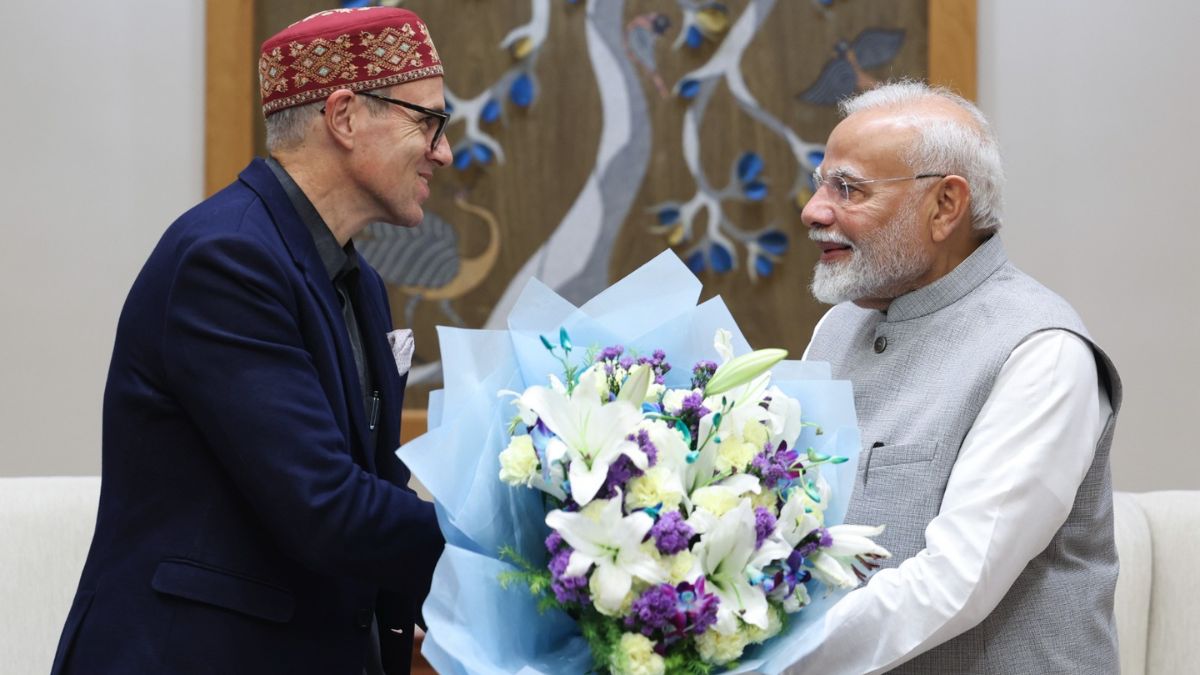Jammu and Kashmir’s newly elected Chief Minister, Omar Abdullah, embarked on his first official visit to New Delhi following his recent swearing-in ceremony. His trip marked a significant opportunity to engage with key figures in the national government, including Prime Minister Narendra Modi, and to advocate for the crucial issue of restoring statehood to Jammu and Kashmir. The visit took place against a backdrop of considerable political significance, with the restoration of statehood being a central promise made by the National Conference (NC) during the recent elections. This article delves into the details of Chief Minister Abdullah’s meetings, the discussions held, and the overall political context surrounding the demand for the return of statehood to Jammu and Kashmir.
Omar Abdullah’s Delhi Visit: Key Meetings and Discussions
Meeting with Prime Minister Modi
Omar Abdullah’s meeting with Prime Minister Narendra Modi held considerable importance. While details of their discussion haven’t been officially released, the meeting itself signals the commencement of formal dialogue between the newly elected J&K government and the central government. The primary expectation was that Mr. Abdullah would present the J&K cabinet’s resolution requesting the restoration of statehood, a key electoral pledge of the NC. The absence of official confirmation regarding the submission of the resolution adds an element of intrigue to the proceedings. The meeting, however, underscores the significance of open communication between the central and state governments on this critical matter.
Engagement with other Union Ministers
Beyond his interaction with the Prime Minister, Omar Abdullah also met with several other prominent Union ministers. His discussions with Union Home Minister Amit Shah, reportedly focusing on the submission of the statehood resolution passed by the J&K cabinet, were highly anticipated. Similarly, his meetings with Defence Minister Rajnath Singh and Road Transport & Highways Minister Nitin Gadkari demonstrate the broad range of issues discussed, extending beyond the primary focus of statehood to encompass critical infrastructural development projects and overall progress of the region. The Defence Minister’s reiteration of PM Modi’s commitment to J&K’s progress further highlights the central government’s interest in promoting development and stability. Discussions with Mr. Gadkari focused on the progress of key highway and road projects across J&K, showcasing the mutual interest in improving the state’s infrastructure.
The Political Landscape of Jammu and Kashmir
The recent elections in Jammu and Kashmir resulted in a significant victory for the National Conference (NC), which, along with the Congress, forms the current ruling coalition. The restoration of statehood emerged as the NC’s defining campaign pledge, resonating deeply with the electorate. The NC secured a substantial number of seats (42), a significant achievement considering the political context. The BJP secured 29 seats, a number indicative of its consistent presence and support in J&K’s political arena. This composition of the Legislative Assembly underscores the complex dynamics at play, emphasizing the necessity for effective collaboration between the state and central governments to foster progress and stability within J&K.
The Abrogation of Article 370 and its Aftermath
The abrogation of Articles 370 and 35A in August 2019 profoundly altered Jammu and Kashmir’s political landscape and constitutional status. This move effectively transformed the state into two Union Territories—Jammu and Kashmir, and Ladakh—raising questions of self-governance and local autonomy. The ongoing political dialogue revolves around the extent to which these changes will be addressed. This has brought on significant political change and the recent elections indicate an active and participatory political climate in the region, though the underlying issues of self-governance and political identity continue to resonate strongly in the region.
Statehood Restoration: Promises and Expectations
Both the Union Home Minister and the Prime Minister have made public assurances regarding the restoration of statehood to Jammu and Kashmir. The union government also filed an affidavit to the Supreme Court, reiterating this commitment and assuring that the process would be undertaken “as soon as possible.” These promises and ongoing political discussions reflect a commitment from the central government. While the timing and precise modalities of restoring statehood remain unclear, these commitments demonstrate an effort by the central government to respond to the concerns of the people of Jammu and Kashmir.
Moving Forward: Challenges and Opportunities
The restoration of statehood represents a significant challenge but also a unique opportunity for Jammu and Kashmir. Successfully navigating the political, constitutional, and administrative complexities of this transition requires collaborative effort and a shared vision between the state and central governments. While the political landscape is complex and nuanced, the meetings between Chief Minister Abdullah and various union ministers highlight a renewed focus on constructive dialogue and cooperation towards resolving critical matters such as statehood, infrastructural improvements, and ultimately sustainable development. A stable political atmosphere and commitment to resolving the concerns of the populace will be key to successful and progressive development.
Challenges ahead
Jammu and Kashmir faces numerous challenges, including rebuilding trust, strengthening security, promoting economic growth, and upholding the rights of the residents. Successfully addressing these concerns while accommodating different political viewpoints requires strong political will from all participating sides. The road to a fully restored state is a process that demands sustained and determined attention from the central and regional political leadership. In conclusion, the current situation demands commitment from all involved actors toward creating an environment of mutual respect and trust for future constructive interaction, negotiation and stability in the long run.
Take Away Points:
- Chief Minister Omar Abdullah’s visit to Delhi initiated important dialogues with the central government regarding the restoration of statehood to Jammu and Kashmir.
- The meetings highlight the ongoing engagement between the central and state governments on critical matters, signifying the process of communication and resolving crucial concerns.
- The restoration of statehood remains a central political issue, demanding cooperative efforts and effective compromise between various political factions.
- Jammu and Kashmir faces many challenges, necessitating a unified approach to promote trust, prosperity, and progress.
- Open communication and collaboration will be crucial in charting a path toward lasting stability and prosperity for the region.




